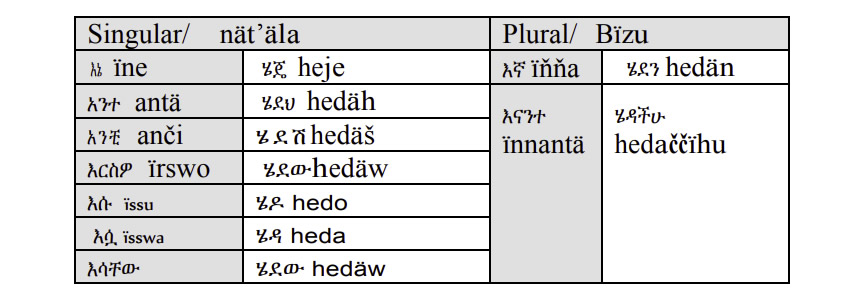Difference between revisions of "Language/Amharic/Grammar/Simple-Gerundive"
| Line 1: | Line 1: | ||
[[File:Amharic-Language-PolyglotClub.png|thumb]] | |||
<div style="font-size:300%;"> Simple Gerundive in Amharic</div> | <div style="font-size:300%;"> Simple Gerundive in Amharic</div> | ||
Revision as of 22:45, 19 September 2021
Consecutive actions in the past
In English, we express consecutive actions in the past with the conjunction and. “I went to school and took a test.” “She arrived at the restaurant and drank coffee.” In Amharic, however, it is more common to see these sequences addressed using a verb form called the gerundive, which has no exact equivalent in English.
Look at the following examples of how two consecutive actions in the past can be combined:
1. ሱቅ ሄደ suk’ hedä.
2. እስክሪፕቶ ገዛ їskripto gäza.
3. ሱቅ ሄዶ እስክሪፕቶ ገዛ suk’ hedo ïskripto gäza. “He went to the store and bought a pen.” (He going to the store, he bought a pen.)
The first action in all of these examples precedes and is somehow subordinate to the “main” action of the sentence: I had to go to school before I could take the test; she had to arrive at the restaurant before she could take some coffee; he had to go to the store before he could buy the pen. Look at the table below.
This pattern also applies to consecutive actions in the future:
(e.g.ትምህርቴን እጨርሳለሁ tïmïhїrten ïč’ärsalähu
ባንክ ውስጥ እሰራለሁ bank wїst’ ïsäralähu
ትምህርቴን ጨርሼ ባንክ ውስጥ እሰራለሁ tïmïhїrten č’ärše bank wїst’ ïsäralähu (finishing my studies, I will work at a bank)
This tense can also be used in the present tense to indicate precedence of actions. It can also be used with the approximate meaning of verbs in English ending in “-ing” (e.g. ሮጣ መጣች rota mätač = she came running).
Look at the following example of a verb in the simple gerundive.
The construction of this tense will be left for the Grammar Appendix. However, listen for this tense when you hear native speakers talking to one another.
Source
https://www.livelingua.com/peace-corps/Amharic/Amharic%20Peace%20Corps%20Language%20Manual-2015.pdf

